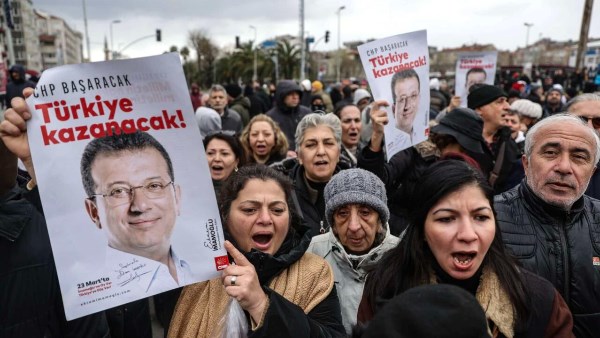
Turkey’s sovereign bonds were the leading performers
Turkish Bonds and Stocks Rebound as Officials Calm Investors

Turkish bonds and stocks rebound as top economic officials stepped up efforts to soothe foreign-investor concerns about last week’s detention of a key opposition politician, which triggered billions of dollars in outflows.
Finance Minister Mehmet Simsek and central bank Governor Fatih Karahan are scheduled to speak at 1 p.m. London time in a teleconference organized by Citigroup Inc. and Deutsche Bank, the Treasury said on its website, confirming a report first published by Bloomberg News.
They are expected to reinforce President Recep Tayyip Erdogan’s pledge yesterday to maintain the broadly investor-friendly policies in place since Simsek, a former Wall Street banker, was appointed in mid-2023.
Turkey’s sovereign bonds were the leading performers among emerging-market debt on Tuesday while the country’s main equities index soared by as much as 5.5%. The lira was steady against the dollar, helping reassure investors after the currency’s 3% tumble last week.
“Most of the fast money from hedge funds was unwound last week, the real money has not moved yet, hence the call to reassure us,” said Viktor Szabo, senior investment manager at Abrdn Investments. Much depends on the political newsflow but for the time being “we are fine,” he added.
Last Wednesday’s detention and later formal arrest of Istanbul Mayor Ekrem Imamoglu, Erdogan’s most formidable and most popular political rival, has led to mass street protests and sent Turkish assets tumbling.
Authorities have taken emergency measures to stem the financial rout, including raising a key overnight interest rate, intervening in the exchange rate, and banning short-selling of Turkish equities.
“We will never allow the gains we have made from the economy program implemented in the last two years to be harmed,” Erdogan said in televised remarks after a cabinet meeting on Monday. “Our institutions have both the authority and the will to ensure healthy market mechanisms.”
The lira stabilized after Erdogan publicly endorsed Simsek’s economic program, and was trading little changed at 37.9856 per dollar as of 2:57 p.m. in Istanbul. Turkey’s main equities index was up 3.8%, extending Monday’s advance after a 17% drop last week.
While seeking to assuage investors, the government has showed no signs of backing down to protesters who’ve been staging street rallies for nearly a week, with Erdogan describing the demonstrations as “evil.” He blamed the opposition’s reaction for market volatility. Forty-one people were detained in Istanbul for allegedly insulting the president and participating in illegal demonstrations, state-run media reported Tuesday.
Turkish Foreign Minister Hakan Fidan is slated to meet with his US counterpart, Secretary of State Marco Rubio, in Washington on Tuesday. US officials have largely avoided criticism of Turkey since Imamoglu was detained, with State Department spokeswoman Tammy Bruce last week calling it an internal judicial matter.
Market Rout
Ozgur Ozel, chairman of Imamoglu’s party, the Republican People’s Party, called on Monday for the boycott of brands and companies he said were affiliated with government circles. They ranged from media companies to gas stations and a chain of coffee shops.
Turkey’s stocks and currency posted the biggest drops globally last week, and yields on local-currency bonds surged. That was despite the central bank intervening in the foreign-exchange market with an injection of $11.2 billion on March 19 alone, according to estimates by Bloomberg Economics.
The central bank also hiked its overnight rate in an unscheduled meeting on Thursday, then convened executives from the nation’s top lenders on Sunday in another attempt to stem the fallout.
Authorities are meanwhile weighing additional measures to mitigate market volatility, including reducing a withholding taxes on lira deposits, to dissuade locals from converting their lira savings into dollars.
“The central bank has to prevent large-scale dollarization,” said Abrdn’s Szabo. “The bank can easily cover the outflows from foreigners but the conversion of lira deposits could be too much.”
The central bank has been draining excess lira liquidity from the financial system at a record pace, a move aimed at reinforcing tight monetary policy and backstopping the currency. Data compiled by Bloomberg showed excess liras in the system declined to around 234 billion liras ($6.2 billion) on Tuesday from 1.2 trillion liras on March 18, the day before Imamoglu’s detention.
“It looks like officials are trying to draw a line in the sand, hoping that the political storm will blow over and markets will forget the whole thing,” said Nick Rees, the head of macro research at Monex Europe Ltd in London. “For now, it seems to be working.”





-1120252475029447.jpg)















